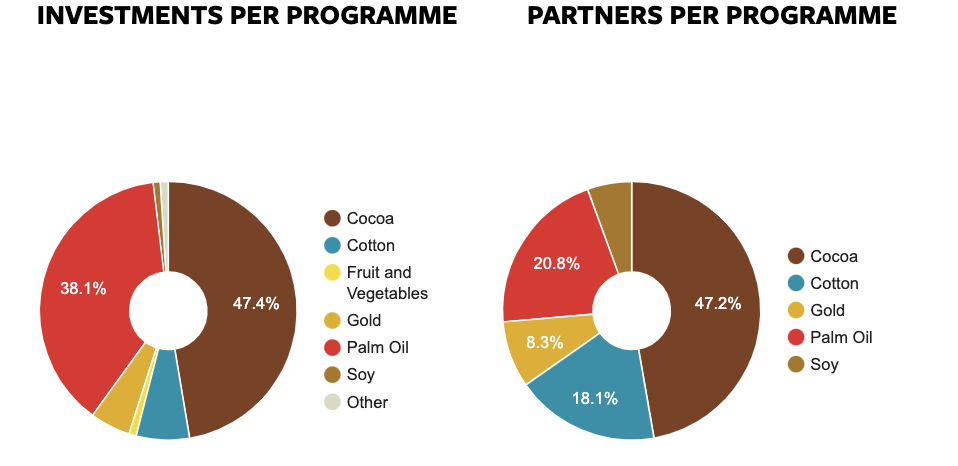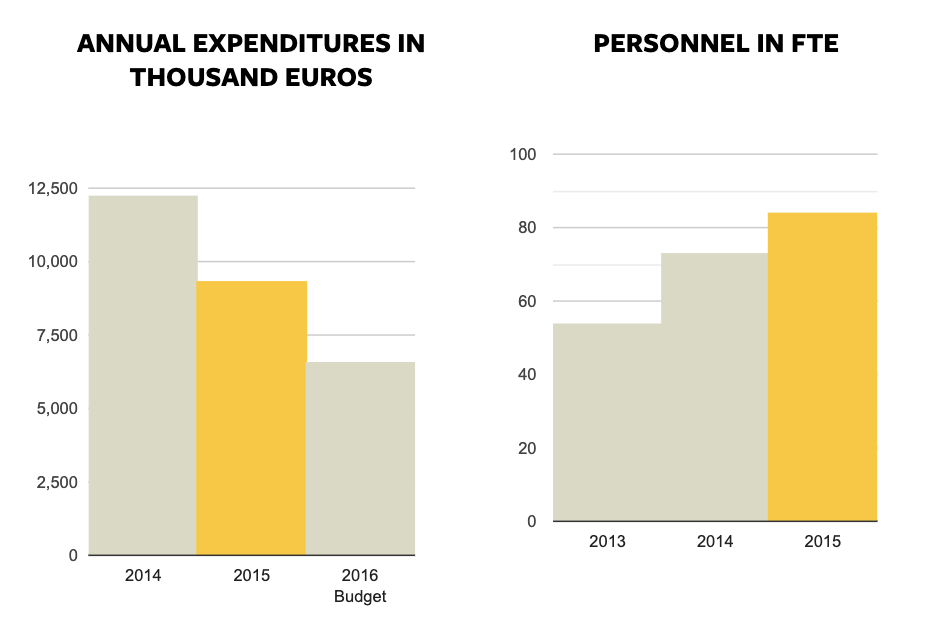REGIONAL COMMODITY PROGRAMMES
Solidaridad West Africa continued to work with supply chain stakeholders and engage them in innovative solutions to improve production, processing and trade, ensuring a transition to a sustainable and inclusive economy that maximizes benefit for all. Solidaridad is implementing a number of cocoa programmes in partnership with private cocoa industry companies, government and other stakeholders in Cote d’Ivoire, Ghana and Nigeria.

During 2015, Solidaridad West Africa continued the implementation of the Sustainable Maize Programme North Ghana (FDOV12GH01) project in collaboration with farmer association Masara N’Arziki and agro-input dealers, Wienco and Yara Ghana Ltd. The five-year project funded by the Dutch Ministry of Foreign Affairs from 2013-2018 is expected to increase farmer incomes and yields while safeguarding the environment through sustainable production practices in northern Ghana.

In spite of the negative image of small-scale mining in Ghana, Solidaridad continues to emphasize the economics of the sector. The gold programme continues to pursue its objective of improving the livelihoods of small-scale miners and the communities that surround them in Ghana. Currently, a gold project has been completed, namely the Face of Ghana’s Gold, which was implemented from 2012 to 2015 with the aim of improving the lives miners and addressing the negative effects of their activities on the environment.

Solidaridad’s oil palm programme has gone through four years of establishing a good foundation for a shift towards more sustainable practices in the oil palm sector in Ghana, Cote d’Ivoire and Nigeria. The oil palm programme is implemented under the Sustainable Oil Palm Programme in West Africa. The Best Management Practice was promoted as a key approach to increasing yields and profitability of oil palm farms.

DEVELOPMENTS
Governments in the region continue to depend heavily on agricultural foreign exchange earnings from agricultural exports (raw materials) for their national budgets. Agriculture is the main driver of economic development in the region, yet it is underdeveloped. Not much is done to overcome the numerous challenges ranging from non-commercialized farming systems, poor soil fertility, lack of use of innovative technologies in production, land tenure, poor storage, poor transportation network, dwindling arable lands, labour intensive systems, expansion of farms into forest margins and general degradation of natural resources.
Food insecurity issues continue to gain priority attention in all national development agendas in the region. Public investments are therefore seen as key in addressing agricultural growth in Africa and sub-Saharan Africa (SSA). Donor funding to address food insecurity and agricultural development focuses on Africa and particularly sub-Saharan Africa (including West Africa).
The implementation of such initiatives as the Comprehensive African Agricultural Development Programme (CAADP) aims to sustain Africa’s agriculture and boost it through increased public sector investments from the current average of 6% to a minimum of 10% of GDP of member countries. The West African Seed Programme which started in 2012, and the West African Fertilizer Programme initiated in 2012, offer opportunities for Solidaridad West Africa and her partners to tap into.

ACHIEVEMENTS
Gains made in 2015 were on producer support programmes, voluntary certification standards, policy advocacy and landscape management. Overall, 137,055 producers and workers were supported in cocoa, oil palm, gold and annual crops across West Africa.
In addition, 20 Rural Service Centres were operational under the Cocoa Rehabilitation and Intensification Programme (CORIP) – Ghana. The centres are providing production support services that would enable farmers to continue to adopt the full package of intensification; namely, use of improved planting material, integrated soil fertility management, rational use of agro-pesticides and application of good farm management practices with supportive financial access.
Over 160% yield increases were recorded in the mid-scale oil palm farms and plantations using the best management practices (BMP) in Ghana, Cote d’Ivoire and Nigeria. Yields increased from an average of 6.85mt/ha/year in 2013 to 18.2/ha/year as of December 2015, (in fact yields as high as 24mt/ha/year and 30mt/ha/year were recorded in some mid-scale farms and plantations respectively). The introduction of improved milling machines (screw press) to selected artisanal mills has increased extraction rate from 9% to an average of 16%. As part of efforts to expand investments in the oil palm sector, Solidaridad facilitated a $2.5 million loan under the Unilever-Acumen facility for the construction a 5mt/hour mill for the benefit of smallholder farms under the Golden Star Oil Palm Program.
Two mines, Dakete Small Scale Mining Company in Tarkwa and Golden Resources in Wassa Akropong, reached the level of Fairmined certification and are both due for external audits in 2016.
Solidaridad and Steltman Jeweller from The Hague jointly organized a Gold Design competition in mid-2015. Steltman Jeweller bought 20 grams of the first ever traceable gold from Ghana. The gold was used for a design contest as part of the “Don’t let miners lose in the race for Good Gold” campaign.

PARTNERSHIPS
Solidaridad West Africa continues to forge closer working relationships with the private and public institutions as well as government agencies to support its operations in the various countries.
In the cocoa sector, key partners include Ghana Cocoa Board, Cargill, ECOM, Touton, Conservation Alliance, Worldwide Fund for Nature (WWF), Cocoa Abrabopa Association, LBCs, who are all committed to investing in sustainable cocoa production. Their commitment has been expressed by investing in the Cocoa Rehabilitation Programme (CORIP) .The Master Card Foundation is supporting a five-year innovative programme dubbed “MASO” that seeks to address the challenges of youth unemployment and developing cocoa entrepreneurs to establish businesses supporting the cocoa industry. MASO is implemented by a consortium consisting of the Ghana Cocoa Board, Aflatoun, Ashesi University, and Opportunity International Savings and Loans as well Fidelity Bank Ghana Limited. Additionally, the consortium will work closely with the following Licensed Cocoa Buying Companies: Mondelez, Unilever, Marks & Spencer’s, ADMECOM, Cargill and Touton amongst others.
A Financial and Social Literacy for Youth in Cocoa project was jointly implemented by Solidaridad West Africa, Aflatoun and Source –Trust (ECOM) with funding provided by Unilever.
Private cosmetic and oil companies have continued to demonstrate support for sustainable oil palm production in West Africa. It is anticipated that these commitments will enable Solidaridad to work with various development investors to roll out best practices and lessons gained under the SWAPP. Solidaridad therefore continued to engage with the TFA 2020 processes towards identifying new partnership to be able to contribute to the zero deforestation initiative on oil palm farming in West Africa.
ORGANIZATION
Solidaridad West Africa announced a new organization structure in the last quarter of 2015, which introduced country level offices. The move is intended to strengthen country teams and empower local country programmes to lead, raise funds and direct programmes and projects within their jurisdiction. Country programmes were therefore created in Ghana, Cote d’Ivoire, Nigeria and Liberia. The regional office is still located in Ghana and expected to provide strategic cross-support to the country programmes.
Solidaridad West Africa has grown tremendously in budget size, number and quality of staffing and programmes over the years. From a regional staff strength of 29 people in 2011, the regional expertise centre now employs 73 people. Annual budgets have grown from 1.2 million euros in 2011 to 9 million euros by close of 2015. The region works on six commodities (e.g. cocoa, oil palm, gold, cotton, soy and maize). The growth has come about as a result of the relevance of Solidaridad’s development interventions across commodities and the high quality performance in executing projects. This has resulted in several public and private sector partners engaging with Solidaridad and funding various projects beyond the four primary countries. By the end of 2015, Solidaridad West Africa had projects and programmes in Ghana, Ivory Coast, Nigeria, Cameroon, Senegal and Mali. It is envisaged that the credibility developed over the past years would continue to be a great strength to be capitalized on for developing and deepening existing and future partnerships on projects/programmes.
